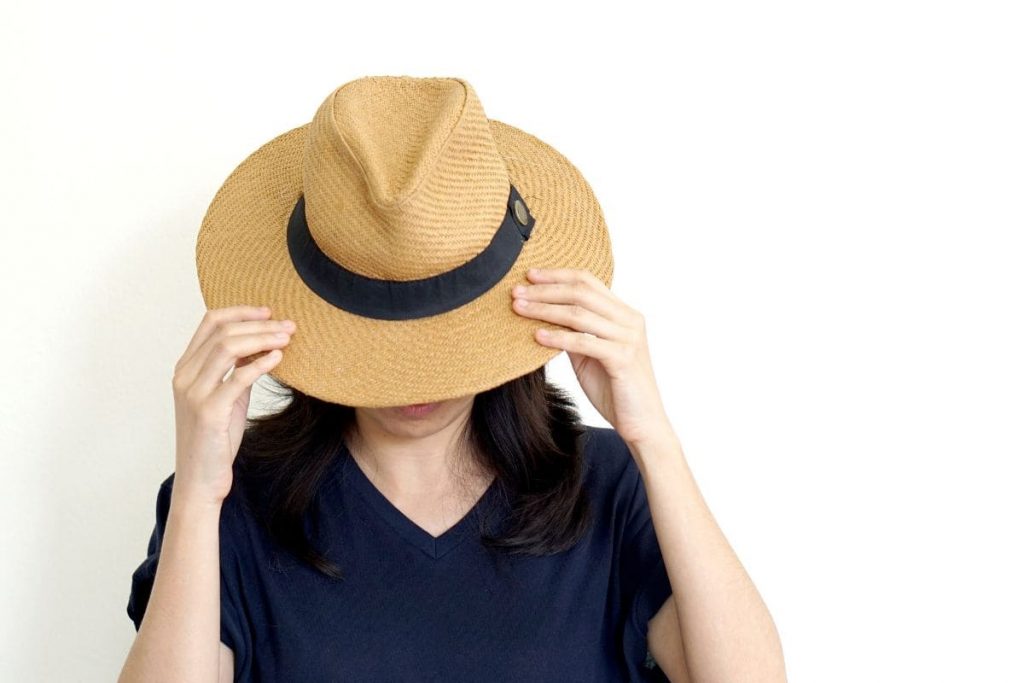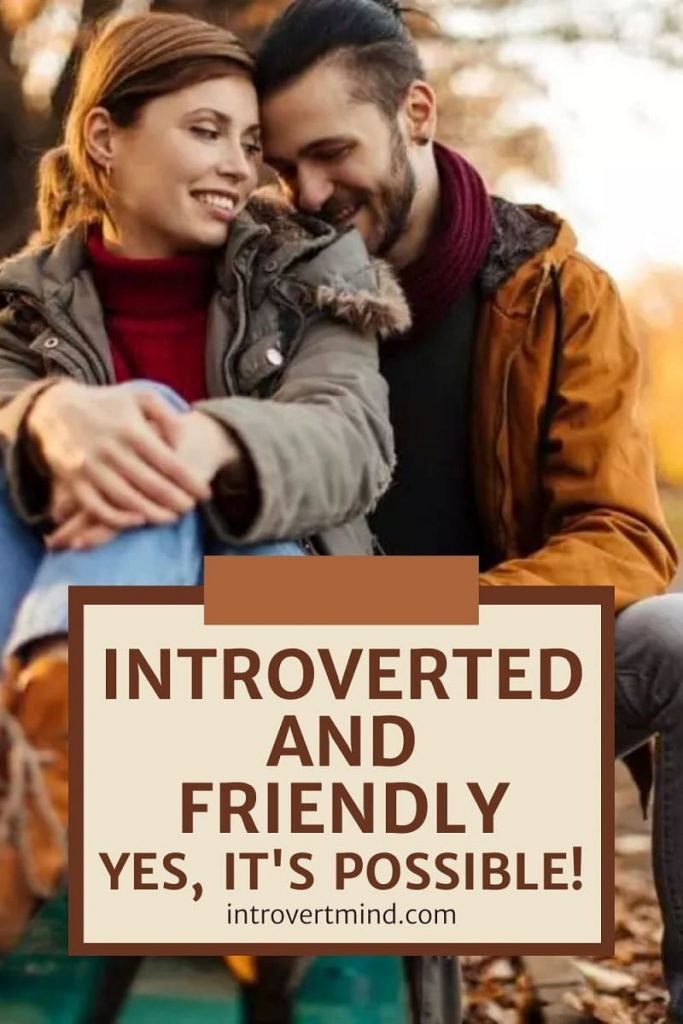Do you ever feel like no one understands the real you? Maybe you give off the wrong impression?
Well, if you’re an introvert, I can relate. People often assume that because I’m friendly and outgoing, I must be extroverted. But that’s not always the case.
It’s possible to be both introverted and sociable at the same time. In the rest of this article, we’ll explore how to establish a balance between being open and maintaining your introversion. And we will show you that just because I’m friendly doesn’t mean I’m not an introvert.
In this article, we will discuss how an introvert can maintain their identity while still being friendly and open with others. We’ll talk about strategies for staying true to yourself without isolating yourself from society and your close friends and peers. So if you find yourself struggling with connecting with others without sacrificing your sense of self, read on!
Introverted And Outgoing: How To Find Your Balance

Being a friendly introvert can be quite a balancing act. On one hand, you have the need to socialize and interact with people, like-minded or not; on the other hand, you also crave moments of solitude that allow you to recharge.
As highly sensitive people, we often face this dilemma of how to stay connected while have fun, spend time with good friends, love people, and still maintaining our personal boundaries.
The key to successfully navigating this situation is learning to read your body language and listen to the signals that it’s sending out. When you feel yourself getting overwhelmed by an extroverted friend or an environment that is too stimulating for your liking, take a step back and explain why you need some alone time.
More on this topic you can find here: Why I need alone time and why it’s not about you.
At the same time, don’t let your introversion limit your potential for making meaningful connections with the world and others. It may take a little bit of effort on your end to make sure that those relationships thrive and grow over time, but it’ll be worth it in the long run.
With these strategies in mind, we can now consider how relationship dynamics differ for friendly introverts as opposed to more extroverted individuals.
Relationship Dynamics For Friendly Introverts

What about those of us who are friendly introverts? Too much interaction can leave us feeling overwhelmed and exhausted. So, it’s important for us to set boundaries and communicate our needs in a healthy way.
But let’s not forget about ourselves! We need some alone time to recharge our batteries and feel more connected with our awesome selves. This way, we can show up fully in our relationships without feeling drained.
Now, let’s get real for a sec. We’re all different and have our own needs when it comes to relationships. What works for me might not work for you, and that’s totally cool. As long as we’re self aware enough of our own needs and respect others, we’re golden.
So, before we move on, let’s talk about something important. It’s important to recognize that shyness and introversion are NOT the same thing – because even though I may be a huge fan of socializing, I’m still an introvert at heart.
Shy Or Introverted? Let’s Clear Up The Confusion

It is interesting to know that while 75% of introverts consider themselves shy, only a handful of 29% of extroverts does. This suggests that there is a difference between introversion and shyness, even though they are often confused.
To put it simply, shyness is a fear of social interaction or judgment, while introversion is more about an internal focus and the need for alone time to recharge and reflect.
Introverts can be friendly and outgoing if they feel comfortable in a situation, but their true character will always lean towards greater reflection rather than action.
On the other hand, shy people may not necessarily prefer solitude; instead, they might often feel overwhelmed or anxious when interacting with a large group of others. They might also have difficulty expressing themselves or speaking up in groups.
Although both introverts and shy people can enjoy socializing in small doses, ultimately it comes down to how energized or drained they feel afterward.
How To Communicate Effectively As A Friendly Introvert

With the right approach and understanding of your own personality type and needs, you can learn how to communicate effectively as a friendly fellow introvert.
Here are some ideas and tips for friendly introverts to communicate effectively:
- Prioritize self-care and give yourself permission to take breaks from socializing if needed. Remember, this doesn’t make you any less of a “people person”.
- Choose social engagements carefully and think about what kind of events or gatherings will energize you versus deplete you. Prioritize accordingly.
- Rely on strong nonverbal cues like body language and facial expressions when communicating with others. This will help conserve your energy and ensure that your communication style works for both you and the other person involved.
- Remember that effective communication is possible as a friendly introvert. Just honor your limits and communicate in a way that works for you.
Ways To Honor Your Limits: Learn The Body Language

The sun was setting and the sky was painted with a vibrant orange hue. I felt an internal tug, a sign from my body to honor my limits.
As an introvert who is friendly, it can be difficult to balance social engagements with personal needs of solitude and rest. But it doesn’t have to be this way. By taking the time to listen to your body, you can learn how best to support yourself in honoring your limits.
One way I prioritize my well-being is by spending time alone and scheduling regular breaks throughout the day or week. For example, when I plan my day ahead of time, I set aside blocks of time dedicated solely to relaxation activities such as reading or journaling. We can help you with the best everyday rituals introverts need to protect their energy.
Another practice I engage in is using “no” as a full sentence when asked by friends or family members if I want to do something that would exceed my energy level. Saying no can feel uncomfortable at first, but it is important for your physical and mental health that you give yourself permission to turn down requests from friends.
From Nervous To Confident: Overcoming Social Anxiety As A Friendly Introvert

Being an introvert and a friendly person can be quite a challenge. It often feels like a tightrope act between being social and wanting to be alone.
I’ve had to learn how to manage these conflicting forces in order to function properly in the world. It took me some time, but I eventually found ways to overcome my social anxiety as an introvert who wants to be friendly with others.
The first thing I did was recognize that it’s okay for me to take a break from socializing when I need it. This gives me space to recharge my energy and process my thoughts without feeling guilty or anxious about not being as outgoing as other people expect me to be.
I also realized that it’s important for me to practice self-care and put my own needs first without worrying about what other people think of me. This has helped me become more secure in myself and less concerned with outside approval or criticism.
I also learned that there are many ways for fellow introverts like myself to enjoy social interaction without feeling overwhelmed or drained by it. By being selective about the types of other social events and activities I participate in, setting boundaries around how much time I spend with other people, and taking breaks when needed, I am able to engage in meaningful and deep conversations, not just small talk, while still maintaining my energy levels.
With this approach, I have been able to build strong relationships while staying true to myself as an introvert who loves being friendly with others.
Introverted And Friendly – Alone Time, Small Talk, Social Settings And More
What Are The Benefits Of Being A Friendly Introvert?

When you are a friendly introvert, people tend to feel more comfortable around you because they can sense your natural warmth and openness.
Introverts tend to usually have strong listening skills which helps them make better connections with other people. As a result, you may find yourself in situations in life where you make meaningful friendships or relationships more easily than others do.
Another benefit of being a friendly introvert is that it can make it easier to advocate for yourself in certain situations. When you are comfortable expressing your feelings and opinions in a respectful way, people will take notice of your own self confidence and be more likely to respect you and understand your point of view.
Additionally, having a strong sense of self-awareness allows for better decision making as well as problem solving capabilities when conflicts arise.
Being a friendly person and introvert has its own unique set of benefits that allow someone to grow both personally and professionally without compromising who they truly are. It opens up opportunities for deep friendships and greater personal connections as well as greater success in achieving goals.
If you embrace your inner introvert while maintaining an open attitude towards others, there is no limit to what you can accomplish!
Are There Any Downsides To Being An Introverted And Friendly Person?

While being introverted and friendly can be a wonderful trait, there can be downsides as well. Introverts may struggle with social anxiety or feeling overwhelmed in large groups, and may need more alone time than their more extroverted peers.
Introverts may have a harder time networking or building large social circles, which can be challenging in certain career or social situations.
However, with self-awareness, self-care, and a willingness to step outside of your comfort zone, introverted and friendly people can thrive in all areas of life.
What Are The Challenges Of Being A Friendly Introvert?

Living with both an introverted and extroverted personality can be like carrying a heavy load on your back. It’s exhausting at times, but being a friendly introvert can come with its own unique set of challenges.
It can be difficult to find the balance between taking time for yourself and staying engaged in social interactions. Also it can be hard to stay motivated when you’re constantly pushing yourself out of your comfort zone. Finally, managing expectations while still maintaining relationships can be challenging.
Finding that balance between solitude and engagement is perhaps the greatest challenge for those who are friendly introverts. Finding the best version of this equilibrium requires a certain level of self-awareness, which can be difficult to maintain amidst all the competing demands of life.
One might feel pressure from peers or family members who expect them to always be available or respond swiftly; this can lead to feelings of guilt or resentment if those expectations cannot always be met due to a need for personal space or time alone.
How Can I Tell The Difference Between Being Shy And Being Introverted?

Figuring out the difference between being shy and being introverted can be difficult. After all, they both involve feeling uncomfortable in social settings. However, there are some key distinctions that can help someone determine which one is more applicable to them.
Shyness is often characterized by a fear or anxiety of others’ opinions of us. It’s a feeling of trepidation when faced with unfamiliar people or awkward situations, which can lead to extreme self-consciousness and a desire to avoid talking or interacting with others. As an introvert, I understand this quite well; I often feel anxious when meeting new people or speaking in front of an audience.
On the other hand, introversion is more about having the need for alone time and solitude to recharge after socializing with few people. While being an introvert doesn’t necessarily mean we dislike social interaction, it does mean that we need to spend more time by ourselves than most people do in order to feel energized and content. Personally, I find that I need some time away from other people every now and then in order to feel my best.
By understanding these two concepts better and recognizing their differences, I’m able to identify which one applies more accurately to me – whether it’s shyness or introversion – and be aware of what I need in order to take care of myself in my work environment and relationships with others.
How Can I Find A Way To Comfortably Interact With Others While Still Respecting My Introverted Nature?

In this digital age, it’s easy to get caught up in the hustle and bustle of everyday life. It can be hard to find a way to comfortably interact with others while still respecting your introverted nature. It’s important to remember that just because you’re friendly doesn’t mean you’re not an introvert. So how can we balance our need for socializing with our need for solitude?
First off, it’s helpful to recognize when conversations are draining or overwhelming your energy levels. When this happens, it’s okay to politely excuse yourself from the conversation or take a break from interacting.
You can also look for ways to engage with small group of people without feeling overly drained, such as making friends easily through online activities like virtual meetups or even virtual game nights. This gives you the chance to still connect with people without having to worry about physical contact or long conversations that may leave you feeling exhausted.
Give yourself permission to have boundaries when it comes to social interaction. Don’t be afraid to set limits on how much time you spend around others and don’t feel guilty if you turn down invitations every once in a while.
By taking these steps, you can find a healthy balance between connecting with others and honoring your own individual needs as an introvert.
Embrace Your Introverted And Friendly Nature

As I look back on my journey to self-discovery, I realize that just because I am friendly doesn’t mean I’m not an introvert. Being an introvert is a part of who I am and it’s something that should be embraced.
It has taken me a lot of time and effort to learn how to balance my need for solitude with my desire to connect with others. But with practice and patience, I’ve been able to find a way to comfortably interact with others while still respecting my introverted nature.
Like the tortoise in Aesop’s fable, I have slowly but surely made progress in understanding myself better and learning how to navigate relationships with others. To represent this progress, I have begun wearing a small golden turtle pendant around my neck as a reminder of the importance of taking things slow and appreciating each step of the journey.
I’m not in a rush – I’m in a journey. I want to savor each milestone and appreciate the little victories. I’m taking it slow, just like the tortoise in Aesop’s fable. This turtle is a symbol of my growth and a reminder to take my time and enjoy the ride.
Ultimately, being an introvert has enriched my life in countless ways and opened up many new opportunities for meaningful connection in life. As long as I stay true to myself and keep striving towards growth and understanding, there is no limit to what I can achieve.


